
What Quick Spreading Virus Relied On Recipients’ Curiosity To Propagate? |
|
Think you know the answer? |
|
from How-To Geek https://ift.tt/2SmnrE6

What Quick Spreading Virus Relied On Recipients’ Curiosity To Propagate? |
|
Think you know the answer? |
|

![]() Theodore Schleifer / Recode:
Theodore Schleifer / Recode:
How Saudi government-related funds, like the country's main tech university endowment and Aramco's Wisayah, invest in US VC firms, often confidentially — People talk about money from “the Saudis.” But it's not that simple. Who exactly are “the Saudis,” anyway?

![]() Amir Bozorgzadeh / VentureBeat:
Amir Bozorgzadeh / VentureBeat:
A look at how AR has found popularity in the enterprise with industrial deployments in automotive assembly lines, quality control, training centres, and more — When I ran my last piece earlier this month on the not-so-surprising progressive state of the VR industry, it was intended to shake …

![]() New York Times:
New York Times:
A look at AI-related research for predicting earthquakes by using seismic data, which scientists say is similar to the audio data used to train voice assistants — SAN FRANCISCO — Countless dollars and entire scientific careers have been dedicated to predicting where and when the next big earthquake will strike.

![]() Motherboard:
Motherboard:
New DMCA exemptions will make it easier for archivists and museums to preserve video games, provided they acquire original game and server codes legally — In a series of rulings, the Library of Congress has carved out a number of exemptions that will help the movement to archive and preserve video games.

![]() FiveThirtyEight:
FiveThirtyEight:
A look at ActBlue, a nonprofit that claims its online fundraising tools have helped raise $2.9B+ for Democrats and progressive orgs since its founding in 2004 — Terry Wolfe has a dog, three cats and a deep desire to help elect members of Congress who will check President Trump.

![]() Andrew Liptak / The Verge:
Andrew Liptak / The Verge:
Paypal bans Gab citing hate speech as a reason for the action after it was revealed that suspected Pittsburgh shooter had an account on the social network — The gunman had a history of anti-semetic posts on the site — Earlier today, a gunman walked into the Tree of Life synagogue in Pittsburgh …
There’s some turmoil brewing over at Miami-based facial recognition startup Kairos. Late last month, New World Angels President and Kairos board chairperson Steve O’Hara sent a letter to Kairos founder Brian Brackeen notifying him of his termination from the role of chief executive officer. The termination letter cited willful misconduct as the cause for Brackeen’s termination. Specifically, O’Hara said Brackeen misled shareholders and potential investors, misappropriated corporate funds, did not report to the board of directors and created a divisive atmosphere.
Kairos is trying to tackle the society-wide problem of discrimination in artificial intelligence. While that’s not the company’s explicit mission — it’s to provide authentication tools to businesses — algorithmic bias has long been a topic the company, especially Brackeen, has addressed.
Brackeen’s purported termination was followed by a lawsuit, on behalf of Kairos, against Brackeen, alleging theft, a breach of fiduciary duties — among other things. Brackeen, in an open letter sent a couple of days ago to shareholders — and one he shared with TechCrunch — about the “poorly constructed coup,” denies the allegations and details his side of the story. He hopes that the lawsuit will be dismissed and that he will officially be reinstated as CEO, he told TechCrunch. As it stands today, Melissa Doval who became CFO of Kairos in July, is acting as interim CEO.
“The Kairos team is amazing and resilient and has blown me away with their commitment to the brand,” Doval told TechCrunch. “I’m humbled by how everybody has just kind of stuck around in light of everything that has transpired.”
The lawsuit, filed on October 10 in Miami-Dade and spearheaded by Kairos COO Mary Wolff, alleges Brackeen “used his position as CEO and founder to further his own agenda of gaining personal notoriety, press, and a reputation in the global technology community” to the detriment of Kairos. The lawsuit describes how Brackeen spent less than 30 percent of his time in the company’s headquarters, “even though the Company was struggling financially.”
Other allegations detail how Brackeen used the company credit card to pay for personal expenses and had the company pay for a car he bought for his then-girlfriend. Kairos alleges Brackeen owes the company at least $60,000.
In his open letter, Brackeen says, “Steve, Melissa and Mary, as cause for my termination and their lawsuit against me, have accused me of stealing 60k from Kairos, comprised of non-work related travel, non-work related expenses, a laptop, and a beach club membership,” Brackeen wrote in a letter to shareholders. “Let’s talk about this. While I immediately found these accusations absurd, I had to consider that, to people on the outside of ‘startup founder’ life— their claims could appear to be salacious, if not illegal.”
Brackeen goes on to say that none of the listed expenses — ranging from trips, meals, rides to iTunes purchases — were not “directly correlated to the business of selling Kairos to customers and investors, and growing Kairos to exit,” he wrote in the open letter. Though, he does note that there may be between $3,500 to $4,500 worth of charges that falls into a “grey area.”
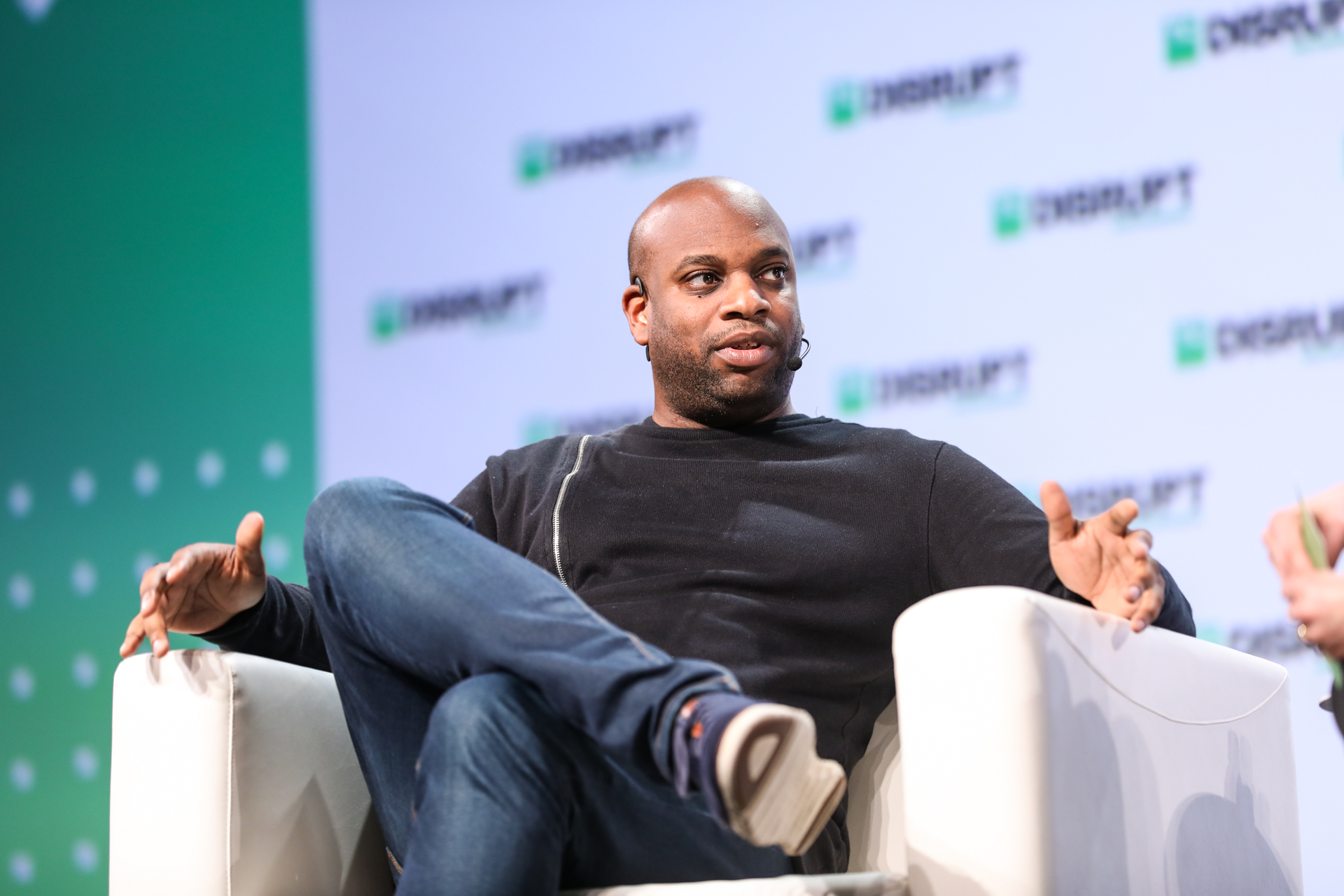
“Conversely, I’ve personally invested, donated, or simply didn’t pay myself in order to make payroll for the rest of the team, to the tune of over $325,000 dollars,” he wrote. “That’s real money from my accounts.”
Regarding forcing Kairos to pay for his then-girlfriend’s car payments, Brackeen explains:
On my making Kairos ‘liable to make my girlfriend’s car payment’— in order to offset the cost of Uber rides to and from work, to meetings, the airport, etc, I determined it would be more cost effective to lease a car. Unfortunately, after having completely extended my personal credit to start and keep Kairos operating, it was necessary that the bank note on the car be obtained through her credit. The board approved the $700 per month per diem arrangement, which ended when I stopped driving the vehicle. Like their entire case— its not very sensational, when truthfully explained.
The company also claims Brackeen has interfered with the company and its affairs since his termination. Throughout his open letter, Brackeen refers to this as an “attempted termination” because, as advised by his lawyers, he has not been legally terminated. He also explains how, in the days leading up to his ouster, Brackeen was seeking to raise additional funding because in August, “we found ourselves in the position of running low on capital.” While he was presenting to potential investors in Singapore, Brackeen said that’s “when access to my email and documents was cut.”
He added, “I traveled to the other side of the world to work with my team on IP development and meet with the people who would commit to millions in investment— and was fired via voicemail the day after I returned.”
Despite the “termination” and lawsuit, O’Hara told TechCrunch via email that “in the interest of peaceful coexistence, we are open to reaching an agreement to allow Brian to remain part of the family as Founder, but not as CEO and with very limited responsibilities and no line authority.”
O’Hara also noted the company’s financials showed there was $44,000 in cash remaining at the end of September. He added, “Then reconcile it with the fact that Brian raised $6MM in 2018 and ask yourself, how does a company go through that kind of money in under 9 months.”
Within the next twelve days, there will be a shareholder vote to remove the board, as well as a vote to reinstate Brackeen as CEO, he told me. After that, Brackeen said he intends to countersue Doval, O’Hara and Wolff.
In addition to New World Angels, Kairos counts Kapor Capital, Backstage Capital and others as investors. At least one investor, Arlan Hamilton of Backstage Capital, has publicly come out in support of Brackeen.
I’m proud of @BrianBrackeen. I’m honored to be his friend. He has handled recent events with his company with grace and patience, and has every right to be screaming inside. I’ve got his back. And he & I only want the best for @LoveKairos.
Certain distractions will be fleeting.
— Arlan
(@ArlanWasHere) October 25, 2018
As previously mentioned, Brackeen has been pretty outspoken about the ethical concerns of facial recognition technologies. In the case of law enforcement, no matter how accurate and unbiased these algorithms are, facial recognition software has no business in law enforcement, Brackeen said at TechCrunch Disrupt in early September. That’s because of the potential for unlawful, excessive surveillance of citizens.
Given the government already has our passport photos and identification photos, “they could put a camera on Main Street and know every single person driving by,” Brackeen said.
And that’s a real possibility. In the last couple of months, Brackeen said Kairos turned down a government request from Homeland Security, seeking facial recognition software for people behind moving cars.
“For us, that’s completely unacceptable,” Brackeen said.
Whether that’s entirely unacceptable for Doval, the interim CEO of Kairos, is not clear. In an interview with TechCrunch, Doval said, “we’re committed to being a responsible and ethical vendor” and that “we’re going to continue to champion the elimination of algorithmic bias in artificial intelligence.” While that’s not a horrific thing to say, it’s much vaguer than saying, “No, we will not ever sell to law enforcement.”
Selling to law enforcement could be lucrative, but that comes with ethical risks and concerns. But if the company is struggling financially, maybe the pros could outweigh the cons.

![]() Dean Takahashi / VentureBeat:
Dean Takahashi / VentureBeat:
Amir Shevat, the VP of Developer Experience at Twitch, talks about new ways of monetization for streamers and developers — As TwitchCon 2018 goes into full swing today, Amazon's livestreaming division Twitch is out to assert its appreciation for its community by doubling down on interaction tools and monetization.

![]() Nellie Bowles / New York Times:
Nellie Bowles / New York Times:
As children of Silicon Valley's elite move away from screen-based schooling, US public schools are touting devices with screens, presaging a new digital gap — America's public schools are still touting devices with screens — even offering digital-only preschools. The rich are banning screens from class altogether.
Chinese startups rule the roost when it comes to total reported venture dollars raised so far in 2018. That is, mostly. In one key category at least — software-as-a-service, better known as SaaS — they do not.
Ant Financial raised the largest-ever VC round in June, a mind-boggling $14 billion in Series C funding. And nearly a dozen privately held Chinese companies, including SenseTime, Du Xiaoman Financial, JD Finance and ELEME, raised $1 billion (yes, with a “b”) or more in single venture rounds thus far in 2018.
But if there’s one thing to note from that shortlist of 2018’s largest China venture rounds, it’s this: almost all of them involve consumer apps and services. Despite being one of the largest economies in the world and currently holding the top spot in the national venture dollar ranks, China doesn’t seem to have too much in the way of enterprise-focused software funding.
But why trust your gut when the trend is borne out in the numbers? In the chart below, we show the top five global markets for SaaS investment (plus the rest of the world). We compare each market’s share of SaaS-earmarked funding against their share of total venture dollars raised in 2018 so far.
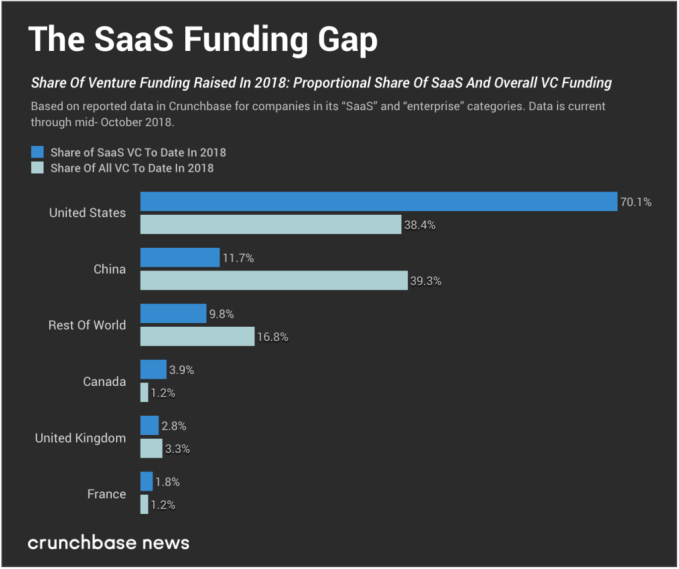
As of mid-October (when we pulled the data for the above chart), Chinese companies accounted for about 39.3 percent of venture funding raised in 2018. Compare that to 38.4 percent for U.S.-based companies, overall. In this respect, the venture markets in the U.S. and China are running neck-and-neck.
Yet for SaaS funding, the China-U.S. gap is about as wide as the Pacific Ocean. The U.S. — top ranked by this measure — accounted for approximately 70.1 percent of known SaaS startup funding. China, by contrast, accounted for just 11.7 percent. No even matchup here. It’s not even close.
This asymmetry goes beyond just aggregate dollar figures. The contrast is starker when we use a slightly more exotic measure for the market.
One of our favorite (if somewhat arbitrary) metrics at Crunchbase News is the count of supergiant venture rounds. These VC deals weigh in at $100 million or more, and they’re reshaping both sides of the venture market for founders and funders alike.
Whereas the United States played host to at least 15 supergiant SaaS VC rounds so far this year, just four rounds raised by three different Chinese SaaS companies crossed the nine-figure mark:
Keep in mind that, in general, U.S. and Chinese markets are fairly even in their output of supergiant venture rounds. However, that’s not the case when we look specifically at SaaS rounds, where the counts and dollar volumes involved are so different.
These disparities suggest a structural difference, not just between the U.S. and Chinese markets, but between the U.S. and the rest of the world when it comes to building and backing SaaS businesses.
At this point it’s unclear, apart from funding metrics, what differentiates the U.S. SaaS market from the rest of the world’s. What conditions exist in this market that don’t exist elsewhere? And are those conditions replicable in a local market with a still-nascent SaaS ecosystem? These are questions meriting a follow-up. Even though its cause might be unclear, for now, it’s nonetheless important to mind the gap. 
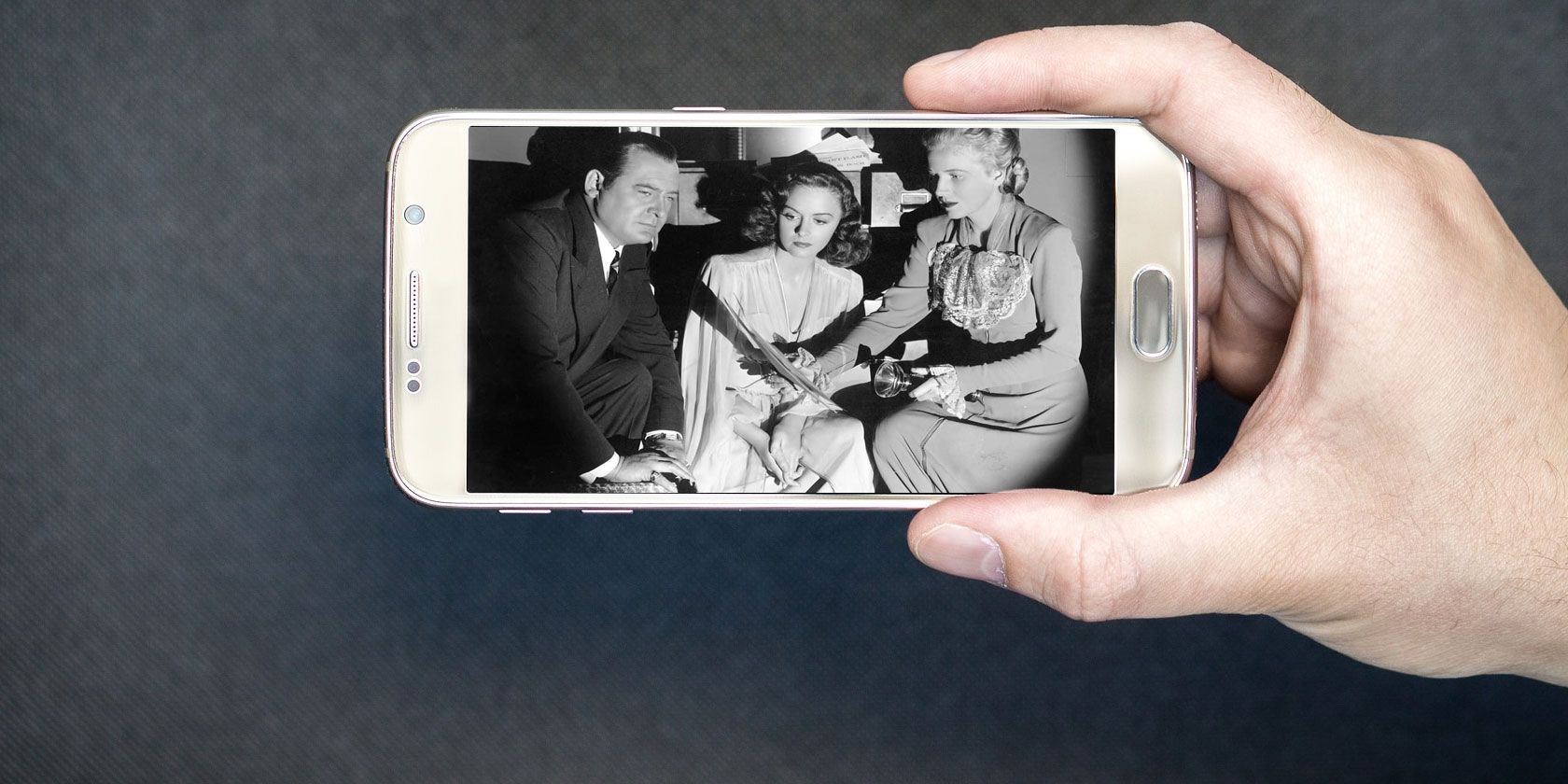
WarnerMedia is shutting down FilmStruck, the best streaming service for classic movies. We were so impressed with what we dubbed the “Netflix for classic movies” that we previously published a guide to FilmStruck. But the streaming service is now no more.
FilmStruck was a streaming service dedicated to classic movies. For $99/year, subscribers would gain access to thousands of classic movies across a range of genres. This included The Criterion Collection, which comprises the most important films in cinematic history.
Sadly, FilmStruck is now being shut down, with a notice on the site saying, “We regret to inform you thank FilmStruck will be shutting down. Our last day of service will be November 29, 2018, and we are currently no longer enrolling new subscribers.”
The FilmStruck team then added a note saying, “We would like to thank our many fans and loyal customers who supported us. FilmStruck was truly a labor of love, and in a world with an abundance of entertainment options—THANK YOU for choosing us.”
FilmStruck will discontinue service on 11/29/18. If you are a current subscriber, please visit https://t.co/ht0FF065M9 for refund information. It has been our pleasure bringing FilmStruck to you and we thank you for your support. pic.twitter.com/J9lGX23V3Y
— FilmStruck (@FilmStruck) October 26, 2018
The closure of FilmStruck is likely owed to AT&T’s acquisition of WarnerMedia. Reports suggest that WarnerMedia is launching a new streaming service in 2019 which will combine content from HBO, Turner, and Warner Bros.. Which leaves little room for a niche service such as FilmStruck.
FilmStruck is the third entertainment service WarnerMedia has shut down in recent months. The other two being DramaFever, a streaming service dedicated to Korean dramas, and Super Deluxe, a comedy hub which launched the careers of some well-known comedians including Maria Bamford and Tim Heidecker.
Fans of classic movies have several options available to them. We have previously covered how to watch classic movies for free online, detailed how to watch classic movies for free on Kodi, and listed the best free movie streaming sites. So, take your pick!
Read the full article: RIP FilmStruck, the Netflix for Classic Movies

![]() Kirsten Korosec / TechCrunch:
Kirsten Korosec / TechCrunch:
Tesla starts rolling out Navigate on Autopilot in the US, an active guidance feature that suggests and makes lane changes, takes highway exits, and more — Some Tesla owners in North America will wake up to a new driver assistance feature that had been delayed for testing, according to a tweet sent Friday evening by CEO Elon Musk.
Facebook founder Mark Zuckerberg’s visage loomed large over the European parliament this week, both literally and figuratively, as global privacy regulators gathered in Brussels to interrogate the human impacts of technologies that derive their power and persuasiveness from our data.
The eponymous social network has been at the center of a privacy storm this year. And every fresh Facebook content concern — be it about discrimination or hate speech or cultural insensitivity — adds to a damaging flood.
The overarching discussion topic at the privacy and data protection confab, both in the public sessions and behind closed doors, was ethics: How to ensure engineers, technologists and companies operate with a sense of civic duty and build products that serve the good of humanity.
So, in other words, how to ensure people’s information is used ethically — not just in compliance with the law. Fundamental rights are increasingly seen by European regulators as a floor not the ceiling. Ethics are needed to fill the gaps where new uses of data keep pushing in.
As the EU’s data protection supervisor, Giovanni Buttarelli, told delegates at the start of the public portion of the International Conference of Data Protection and Privacy Commissioners: “Not everything that is legally compliant and technically feasible is morally sustainable.”
As if on cue Zuckerberg kicked off a pre-recorded video message to the conference with another apology. Albeit this was only for not being there to give an address in person. Which is not the kind of regret many in the room are now looking for, as fresh data breaches and privacy incursions keep being stacked on top of Facebook’s Cambridge Analytica data misuse scandal like an unpalatable layer cake that never stops being baked.
Evidence of a radical shift of mindset is what champions of civic tech are looking for — from Facebook in particular and adtech in general.
But there was no sign of that in Zuckerberg’s potted spiel. Rather he displayed the kind of masterfully slick PR manoeuvering that’s associated with politicians on the campaign trail. It’s the natural patter for certain big tech CEOs too, these days, in a sign of our sociotechnical political times.
(See also: Facebook hiring ex-UK deputy PM, Nick Clegg, to further expand its contacts database of European lawmakers.)
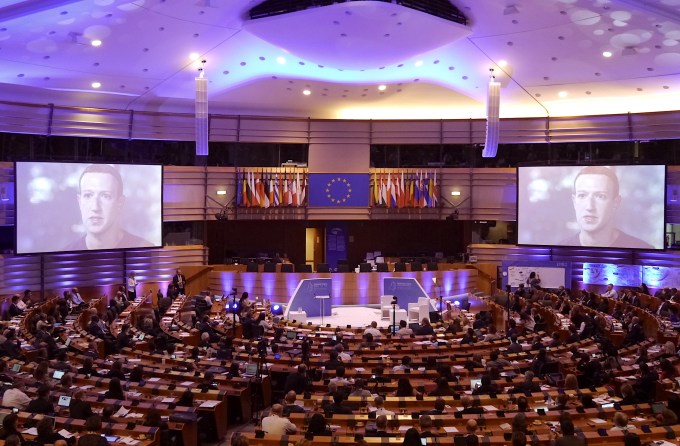
And so the Facebook founder seized on the conference’s discussion topic of big data ethics and tried to zoom right back out again. Backing away from talk of tangible harms and damaging platform defaults — aka the actual conversational substance of the conference (from talk of how dating apps are impacting how much sex people have and with whom they’re doing it; to shiny new biometric identity systems that have rebooted discriminatory caste systems) — to push the idea of a need to “strike a balance between speech, security, privacy and safety”.
This was Facebook trying reframe the idea of digital ethics — to make it so very big-picture-y that it could embrace his people-tracking ad-funded business model as a fuzzily wide public good, with a sort of ‘oh go on then’ shrug.
Indeed, he went further, saying Facebook believes it has an “ethical obligation to protect good uses of technology”.
And from that self-serving perspective almost anything becomes possible — as if Facebook is arguing that breaking data protection law might really be the ‘ethical’ thing to do. (Or, as the existentialists might put it: ‘If god is dead, then everything is permitted’.)
It’s an argument that radically elides some very bad things, though. And glosses over problems that are systemic to Facebook’s ad platform.
A little later, Google’s CEO Sundar Pichai also dropped into the conference in video form, bringing much the same message.
“The conversation about ethics is important. And we are happy to be a part of it,” he began, before an instant hard pivot into referencing Google’s founding mission of “organizing the world’s information — for everyone” (emphasis his), before segwaying — via “knowledge is empowering” — to asserting that “a society with more information is better off than one with less”.
Is having access to more information of unknown and dubious or even malicious provenance better than having access to some verified information? Google seems to think so.
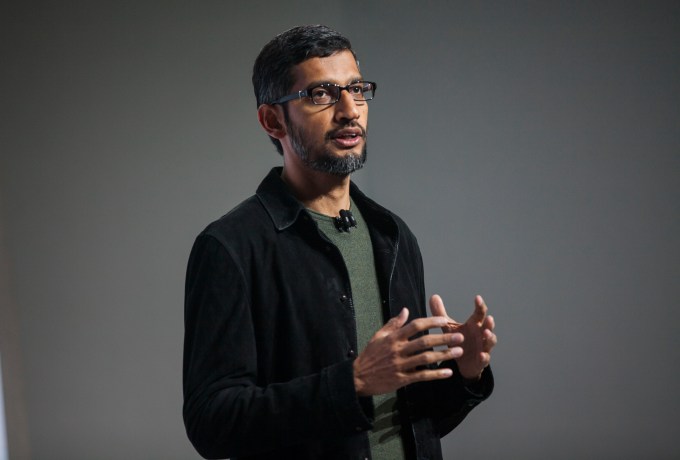
SAN FRANCISCO, CA – OCTOBER 04: Pichai Sundararajan, known as Sundar Pichai, CEO of Google Inc. speaks during an event to introduce Google Pixel phone and other Google products on October 4, 2016 in San Francisco, California. The Google Pixel is intended to challenge the Apple iPhone in the premium smartphone category. (Photo by Ramin Talaie/Getty Images)
The pre-recorded Pichai didn’t have to concern himself with all the mental ellipses bubbling up in the thoughts of the privacy and rights experts in the room.
“Today that mission still applies to everything we do at Google,” his digital image droned on, without mentioning what Google is thinking of doing in China. “It’s clear that technology can be a positive force in our lives. It has the potential to give us back time and extend opportunity to people all over the world.
“But it’s equally clear that we need to be responsible in how we use technology. We want to make sound choices and build products that benefit society that’s why earlier this year we worked with our employees to develop a set of AI principles that clearly state what types of technology applications we will pursue.”
Of course it sounds fine. Yet Pichai made no mention of the staff who’ve actually left Google because of ethical misgivings. Nor the employees still there and still protesting its ‘ethical’ choices.
It’s not almost as if the Internet’s adtech duopoly is singing from the same ‘ads for greater good trumping the bad’ hymn sheet; the Internet’s adtech’s duopoly is doing exactly that.
The ‘we’re not perfect and have lots more to learn’ line that also came from both CEOs seems mostly intended to manage regulatory expectation vis-a-vis data protection — and indeed on the wider ethics front.
They’re not promising to do no harm. Nor to always protect people’s data. They’re literally saying they can’t promise that. Ouch.
Meanwhile, another common FaceGoog message — an intent to introduce ‘more granular user controls’ — just means they’re piling even more responsibility onto individuals to proactively check (and keep checking) that their information is not being horribly abused.
This is a burden neither company can speak to in any other fashion. Because the solution is that their platforms not hoard people’s data in the first place.
The other ginormous elephant in the room is big tech’s massive size; which is itself skewing the market and far more besides.
Neither Zuckerberg nor Pichai directly addressed the notion of overly powerful platforms themselves causing structural societal harms, such as by eroding the civically minded institutions that are essential to defend free societies and indeed uphold the rule of law.
Of course it’s an awkward conversation topic for tech giants if vital institutions and societal norms are being undermined because of your cut-throat profiteering on the unregulated cyber seas.
A great tech fix to avoid answering awkward questions is to send a video message in your CEO’s stead. And/or a few minions. Facebook VP and chief privacy officer, Erin Egan, and Google’s SVP of global affairs Kent Walker, were duly dispatched and gave speeches in person.
They also had a handful of audience questions put to them by an on stage moderator. So it fell to Walker, not Pichai, to speak to Google’s contradictory involvement in China in light of its foundational claim to be a champion of the free flow of information.
“We absolutely believe in the maximum amount of information available to people around the world,” Walker said on that topic, after being allowed to intone on Google’s goodness for almost half an hour. “We have said that we are exploring the possibility of ways of engaging in China to see if there are ways to follow that mission while complying with laws in China.
“That’s an exploratory project — and we are not in a position at this point to have an answer to the question yet. But we continue to work.”
Egan, meanwhile, batted away her trio of audience concerns — about Facebook’s lack of privacy by design/default; and how the company could ever address ethical concerns without dramatically changing its business model — by saying it has a new privacy and data use team sitting horizontally across the business, as well as a data protection officer (an oversight role mandated by the EU’s GDPR; into which Facebook plugged its former global deputy chief privacy officer, Stephen Deadman, earlier this year).
She also said the company continues to invest in AI for content moderation purposes. So, essentially, more trust us. And trust our tech.
She also replied in the affirmative when asked whether Facebook will “unequivocally” support a strong federal privacy law in the US — with protections “equivalent” to those in Europe’s data protection framework.
But of course Zuckerberg has said much the same thing before — while simultaneously advocating for weaker privacy standards domestically. So who now really wants to take Facebook at its word on that? Or indeed on anything of human substance.
Not the EU parliament, for one. MEPs sitting in the parliament’s other building, in Strasbourg, this week adopted a resolution calling for Facebook to agree to an external audit by regional oversight bodies.
But of course Facebook prefers to run its own audit. And in a response statement the company claims it’s “working relentlessly to ensure the transparency, safety and security” of people who use its service (so bad luck if you’re one of those non-users it also tracks then). Which is a very long-winded way of saying ‘no, we’re not going to voluntarily let the inspectors in’.
Facebook’s problem now is that trust, once burnt, takes years and mountains’ worth of effort to restore.
This is the flip side of ‘move fast and break things’. (Indeed, one of the conference panels was entitled ‘move fast and fix things’.) It’s also the hard-to-shift legacy of an unapologetically blind ~decade-long dash for growth regardless of societal cost.
Given the, it looks unlikely that Zuckerberg’s attempt to paint a portrait of digital ethics in his company’s image will do much to restore trust in Facebook.
Not so long as the platform retains the power to cause damage at scale.
It was left to everyone else at the conference to discuss the hollowing out of democratic institutions, societal norms, humans interactions and so on — as a consequence of data (and market capital) being concentrated in the hands of the ridiculously powerful few.
“Today we face the gravest threat to our democracy, to our individual liberty in Europe since the war and the United States perhaps since the civil war,” said Barry Lynn, a former journalist and senior fellow at the Google-backed New America Foundation think tank in Washington, D.C., where he had directed the Open Markets Program — until it was shut down after he wrote critically about, er, Google.
“This threat is the consolidation of power — mainly by Google, Facebook and Amazon — over how we speak to one another, over how we do business with one another.”
Meanwhile the original architect of the World Wide Web, Tim Berners-Lee, who has been warning about the crushing impact of platform power for years now is working on trying to decentralize the net’s data hoarders via new technologies intended to give users greater agency over their data.
On the democratic damage front, Lynn pointed to how news media is being hobbled by an adtech duopoly now sucking hundreds of billion of ad dollars out of the market annually — by renting out what he dubbed their “manipulation machines”.
Not only do they sell access to these ad targeting tools to mainstream advertisers — to sell the usual products, like soap and diapers — they’re also, he pointed out, taking dollars from “autocrats and would be autocrats and other social disruptors to spread propaganda and fake news to a variety of ends, none of them good”.
The platforms’ unhealthy market power is the result of a theft of people’s attention, argued Lynn. “We cannot have democracy if we don’t have a free and robustly funded press,” he warned.
His solution to the society-deforming might of platform power? Not a newfangled decentralization tech but something much older: Market restructuring via competition law.
“The basic problem is how we structure or how we have failed to structure markets in the last generation. How we have licensed or failed to license monopoly corporations to behave.
“In this case what we see here is this great mass of data. The problem is the combination of this great mass of data with monopoly power in the form of control over essential pathways to the market combined with a license to discriminate in the pricing and terms of service. That is the problem.”
“The result is to centralize,” he continued. “To pick and choose winners and losers. In other words the power to reward those who heed the will of the master, and to punish those who defy or question the master — in the hands of Google, Facebook and Amazon… That is destroying the rule of law in our society and is replacing rule of law with rule by power.”
For an example of an entity that’s currently being punished by Facebook’s grip on the social digital sphere you need look no further than Snapchat.
Also on the stage in person: Apple’s CEO Tim Cook, who didn’t mince his words either — attacking what he dubbed a “data industrial complex” which he said is “weaponizing” people’s person data against them for private profit.
The adtech modeus operandi sums to “surveillance”, Cook asserted.
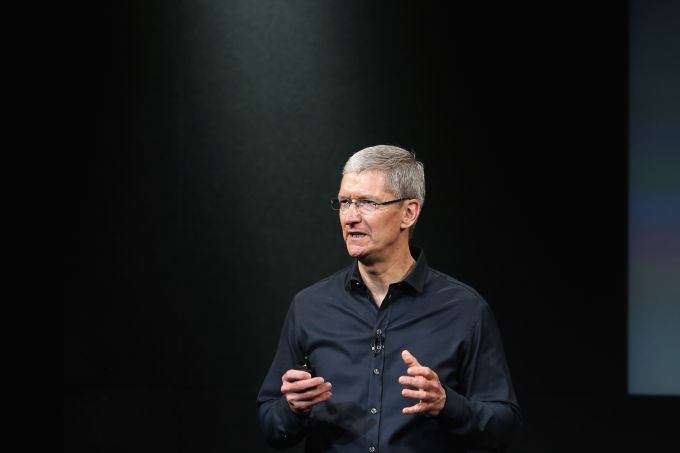
Cook called this a “crisis”, painting a picture of technologies being applied in an ethics-free vacuum to “magnify our worst human tendencies… deepen divisions, incite violence and even undermine our shared sense of what is true and what is false” — by “taking advantage of user trust”.
“This crisis is real… And those of us who believe in technology’s potential for good must not shrink from this moment,” he warned, telling the assembled regulators that Apple is aligned with their civic mission.
Of course Cook’s position also aligns with Apple’s hardware-dominated business model — in which the company makes most of its money by selling premium priced, robustly encrypted devices, rather than monopolizing people’s attention to sell their eyeballs to advertisers.
The growing public and political alarm over how big data platforms stoke addiction and exploit people’s trust and information — and the idea that an overarching framework of not just laws but digital ethics might be needed to control this stuff — dovetails neatly with the alternative track that Apple has been pounding for years.
So for Cupertino it’s easy to argue that the ‘collect it all’ approach of data-hungry platforms is both lazy thinking and irresponsible engineering, as Cook did this week.
“For artificial intelligence to be truly smart it must respect human values — including privacy,” he said. “If we get this wrong, the dangers are profound. We can achieve both great artificial intelligence and great privacy standards. It is not only a possibility — it is a responsibility.”
Yet Apple is not only a hardware business. In recent years the company has been expanding and growing its services business. It even involves itself in (a degree of) digital advertising. And it does business in China.
It is, after all, still a for-profit business — not a human rights regulator. So we shouldn’t be looking to Apple to spec out a digital ethical framework for us, either.
No profit making entity should be used as the model for where the ethical line should lie.
Apple sets a far higher standard than other tech giants, certainly, even as its grip on the market is far more partial because it doesn’t give its stuff away for free. But it’s hardly perfect where privacy is concerned.
One inconvenient example for Apple is that it takes money from Google to make the company’s search engine the default for iOS users — even as it offers iOS users a choice of alternatives (if they go looking to switch) which includes pro-privacy search engine DuckDuckGo.
DDG is a veritable minnow vs Google, and Apple builds products for the consumer mainstream, so it is supporting privacy by putting a niche search engine alongside a behemoth like Google — as one of just four choices it offers.
But defaults are hugely powerful. So Google search being the iOS default means most of Apple’s mobile users will have their queries fed straight into Google’s surveillance database, even as Apple works hard to keep its own servers clear of user data by not collecting their stuff in the first place.
There is a contradiction there. So there is a risk for Apple in amping up its rhetoric against a “data industrial complex” — and making its naturally pro-privacy preference sound like a conviction principle — because it invites people to dial up critical lenses and point out where its defence of personal data against manipulation and exploitation does not live up to its own rhetoric.
One thing is clear: In the current data-based ecosystem all players are conflicted and compromised.
Though only a handful of tech giants have built unchallengeably massive tracking empires via the systematic exploitation of other people’s data.
And as the apparatus of their power gets exposed, these attention-hogging adtech giants are making a dumb show of papering over the myriad ways their platforms pound on people and societies — offering paper-thin promises to ‘do better next time — when ‘better’ is not even close to being enough.
Increasingly powerful data-mining technologies must be sensitive to human rights and human impacts, that much is crystal clear. Nor is it enough to be reactive to problems after or even at the moment they arise. No engineer or system designer should feel it’s their job to manipulate and trick their fellow humans.
Dark pattern designs should be repurposed into a guidebook of what not to do and how not to transact online. (If you want a mission statement for thinking about this it really is simple: Just don’t be a dick.)
Sociotechnical Internet technologies must always be designed with people and societies in mind — a key point that was hammered home in a keynote by Berners-Lee, the inventor of the World Wide Web, and the tech guy now trying to defang the Internet’s occupying corporate forces via decentralization.
“As we’re designing the system, we’re designing society,” he told the conference. “Ethical rules that we choose to put in that design [impact society]… Nothing is self evident. Everything has to be put out there as something that we think we will be a good idea as a component of our society.”
The penny looks to be dropping for privacy watchdogs in Europe. The idea that assessing fairness — not just legal compliance — must be a key component of their thinking, going forward, and so the direction of regulatory travel.
Watchdogs like the UK’s ICO — which just fined Facebook the maximum possible penalty for the Cambridge Analytica scandal — said so this week. “You have to do your homework as a company to think about fairness,” said Elizabeth Denham, when asked ‘who decides what’s fair’ in a data ethics context. “At the end of the day if you are working, providing services in Europe then the regulator’s going to have something to say about fairness — which we have in some cases.”
“Right now, we’re working with some Oxford academics on transparency and algorithmic decision making. We’re also working on our own tool as a regulator on how we are going to audit algorithms,” she added. “I think in Europe we’re leading the way — and I realize that’s not the legal requirement in the rest of the world but I believe that more and more companies are going to look to the high standard that is now in place with the GDPR.
“The answer to the question is ‘is this fair?’ It may be legal — but is this fair?”
So the short version is data controllers need to prepare themselves to consult widely — and examine their consciences closely.
Rising automation and AI makes ethical design choices even more imperative, as technologies become increasingly complex and intertwined, thanks to the massive amounts of data being captured, processed and used to model all sorts of human facets and functions.
The closed session of the conference produced a declaration on ethics and data in artificial intelligence — setting out a list of guiding principles to act as “core values to preserve human rights” in the developing AI era — which included concepts like fairness and responsible design.
Few would argue that a powerful AI-based technology such as facial recognition isn’t inherently in tension with a fundamental human right like privacy.
Nor that such powerful technologies aren’t at huge risk of being misused and abused to discriminate and/or suppress rights at vast and terrifying scale. (See, for example, China’s push to install a social credit system.)
Biometric ID systems might start out with claims of the very best intentions — only to shift function and impact later. The dangers to human rights of function creep on this front are very real indeed. And are already being felt in places like India — where the country’s Aadhaar biometric ID system has been accused of rebooting ancient prejudices by promoting a digital caste system, as the conference also heard.
The consensus from the event is it’s not only possible but vital to engineer ethics into system design from the start whenever you’re doing things with other people’s data. And that routes to market must be found that don’t require dispensing with a moral compass to get there.
The notion of data-processing platforms becoming information fiduciaries — i.e. having a legal duty of care towards their users, as a doctor or lawyer does — was floated several times during public discussions. Though such a step would likely require more legislation, not just adequately rigorous self examination.
In the meanwhile civic society must get to grips, and grapple proactively, with technologies like AI so that people and societies can come to collective agreement about a digital ethics framework. This is vital work to defend the things that matter to communities so that the anthropogenic platforms Berners-Lee referenced are shaped by collective human values, not the other way around.
It’s also essential that public debate about digital ethics does not get hijacked by corporate self interest.
Tech giants are not only inherently conflicted on the topic but — right across the board — they lack the internal diversity to offer a broad enough perspective.
People and civic society must teach them.
A vital closing contribution came from the French data watchdog’s Isabelle Falque-Pierrotin, who summed up discussions that had taken place behind closed doors as the community of global data protection commissioners met to plot next steps.
She explained that members had adopted a roadmap for the future of the conference to evolve beyond a mere talking shop and take on a more visible, open governance structure — to allow it to be a vehicle for collective, international decision-making on ethical standards, and so alight on and adopt common positions and principles that can push tech in a human direction.
The initial declaration document on ethics and AI is intended to be just the start, she said — warning that “if we can’t act we will not be able to collectively control our future”, and couching ethics as “no longer an option, it is an obligation”.
She also said it’s essential that regulators get with the program and enforce current privacy laws — to “pave the way towards a digital ethics” — echoing calls from many speakers at the event for regulators to get on with the job of enforcement.
This is vital work to defend values and rights against the overreach of the digital here and now.
“Without ethics, without an adequate enforcement of our values and rules our societal models are at risk,” Falque-Pierrotin also warned. “We must act… because if we fail, there won’t be any winners. Not the people, nor the companies. And certainly not human rights and democracy.”
If the conference had one short sharp message it was this: Society must wake up to technology — and fast.
“We’ve got a lot of work to do, and a lot of discussion — across the boundaries of individuals, companies and governments,” agreed Berners-Lee. “But very important work.
“We have to get commitments from companies to make their platforms constructive and we have to get commitments from governments to look at whenever they see that a new technology allows people to be taken advantage of, allows a new form of crime to get onto it by producing new forms of the law. And to make sure that the policies that they do are thought about in respect to every new technology as they come out.”
This work is also an opportunity for civic society to define and reaffirm what’s important. So it’s not only about mitigating risks.
But, equally, not doing the job is unthinkable — because there’s no putting the AI genii back in the bottle.
Justine and Olivia Moore like to introduce themselves together, otherwise, it can be a little confusing.
They live together in an apartment in Menlo Park. They share clothes. They both wear Rothy’s sustainable ballet flats and are big fans of Glossier. Their desks are only inches apart, because yes, they work together too — and because they share a space heater.
The 24-year-old identical twins are venture investors at CRV, a Palo Alto-based venture capital firm they joined a little over a year ago. They call themselves The Venture Twins and they may just be the nearly 50-year-old firm’s secret weapon.
CRV hired Justine and Olivia to work under Saar Gur, a general partner responsible for leading deals in Bird, DoorDash, Patreon, Dropbox and ClassPass, in 2017. He was looking to expand CRV’s consumer team when he found Justine, a recent Stanford economics graduate who was finishing a year-long stint at Goldman Sachs.
It wasn’t long before Justine’s references were urging Saar to hire her twin sister, too. “They are such a good team;” “You should hire both of them;” “They work great together,” they’d tell him.
The Portland natives have an impressive resume. At Stanford, they launched Cardinal Ventures, a first-of-its-kind on-campus startup incubator. Plus, one might say they were bred for venture capital. Their mother, Darcy Moore, was also a VC. She retired when they were just five years old, but the pair remember walking into pitch meetings and observing demo days before starting kindergarten.
“The cool thing to say is ‘oh, I never wanted to be in venture; I stumbled into it,’ but we have always wanted to be in venture,” Justine told TechCrunch.
Despite long-held ambitions to become venture capitalists, Justine and Olivia enrolled at Stanford in 2012 to study journalism. After some time on The Stanford Daily covering the entrepreneurship beat, they realized journalism wasn’t going to quench their thirst for innovation.
Their junior year, they created Cardinal Ventures. The program gives two cohorts of 12 to 20 startups per year $5,000 in non-dilutive capital and supports them with 10 weeks of mentorship and programming. For the twins, Cardinal granted them access to some of Silicon Valley’s best investors.
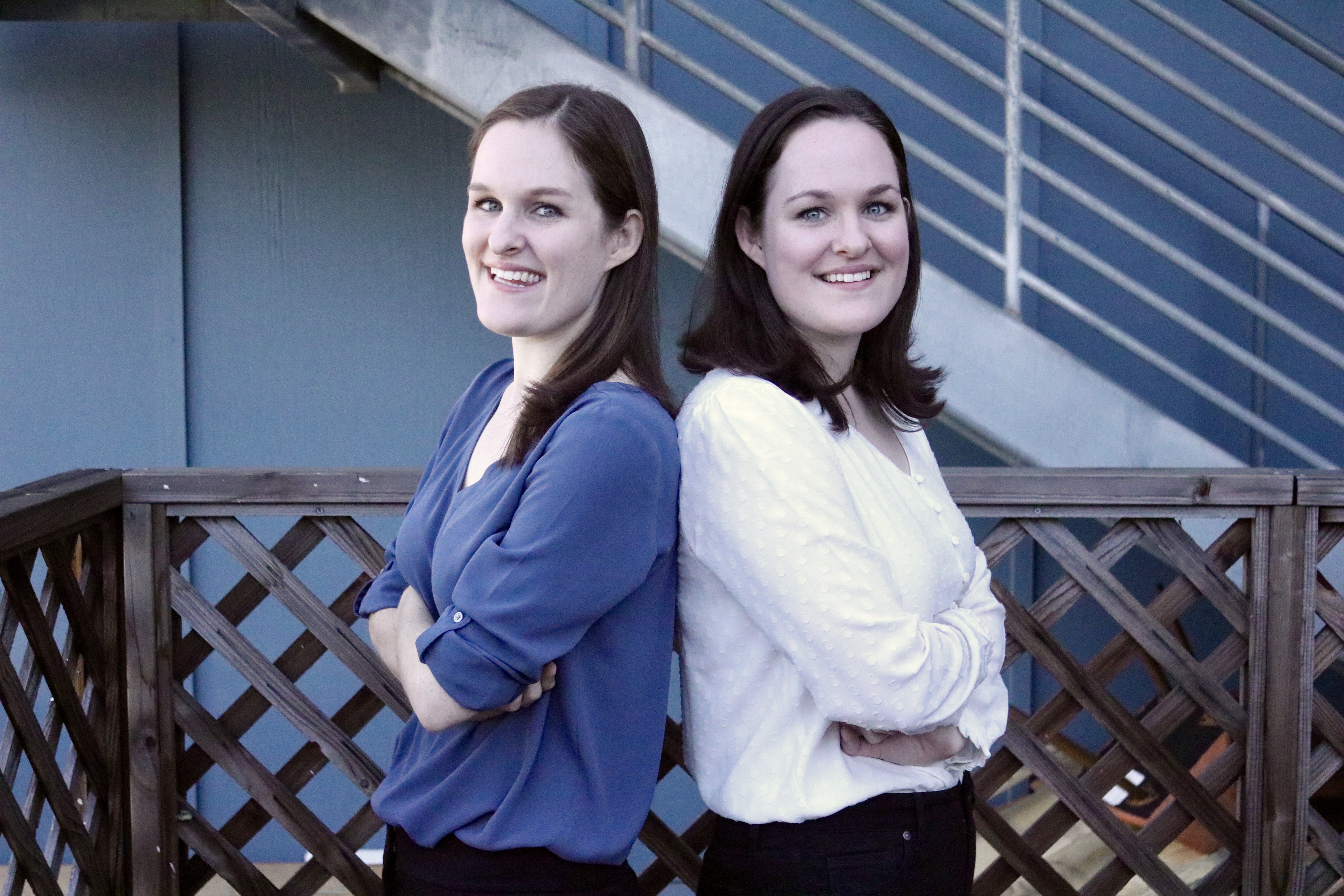
Justine (left) and her twin sister Olivia are venture investors at CRV.
By their senior year, they were fielding internship offers from those top-notch VCs. Olivia accepted an internship at First Round Capital, while Justine went to work at Cowboy Ventures. After graduation, they both went to work as analysts at Goldman.
After one year on the public equities team for Olivia and the private equities team for Justine, the twins were ready to transition into venture for good. They had met with CRV’s partners during their Cardinal Ventures days and felt the opportunity to work with Gur on consumer tech investing was something they couldn’t pass up. That, and the firm was willing to give them the freedom they needed to build their personal brand.
In addition to their Twitter account, @VentureTwins, and a very active Medium page, Justine and Olivia have a weekly newsletter called Accelerated that’s racked up some 5,200 subscribers since it launched one year ago.
The newsletter is written for college students. It provides the week’s biggest news in tech, notable internship and job openings, recommended reads and surveys on industry topics and trends for readers to complete.
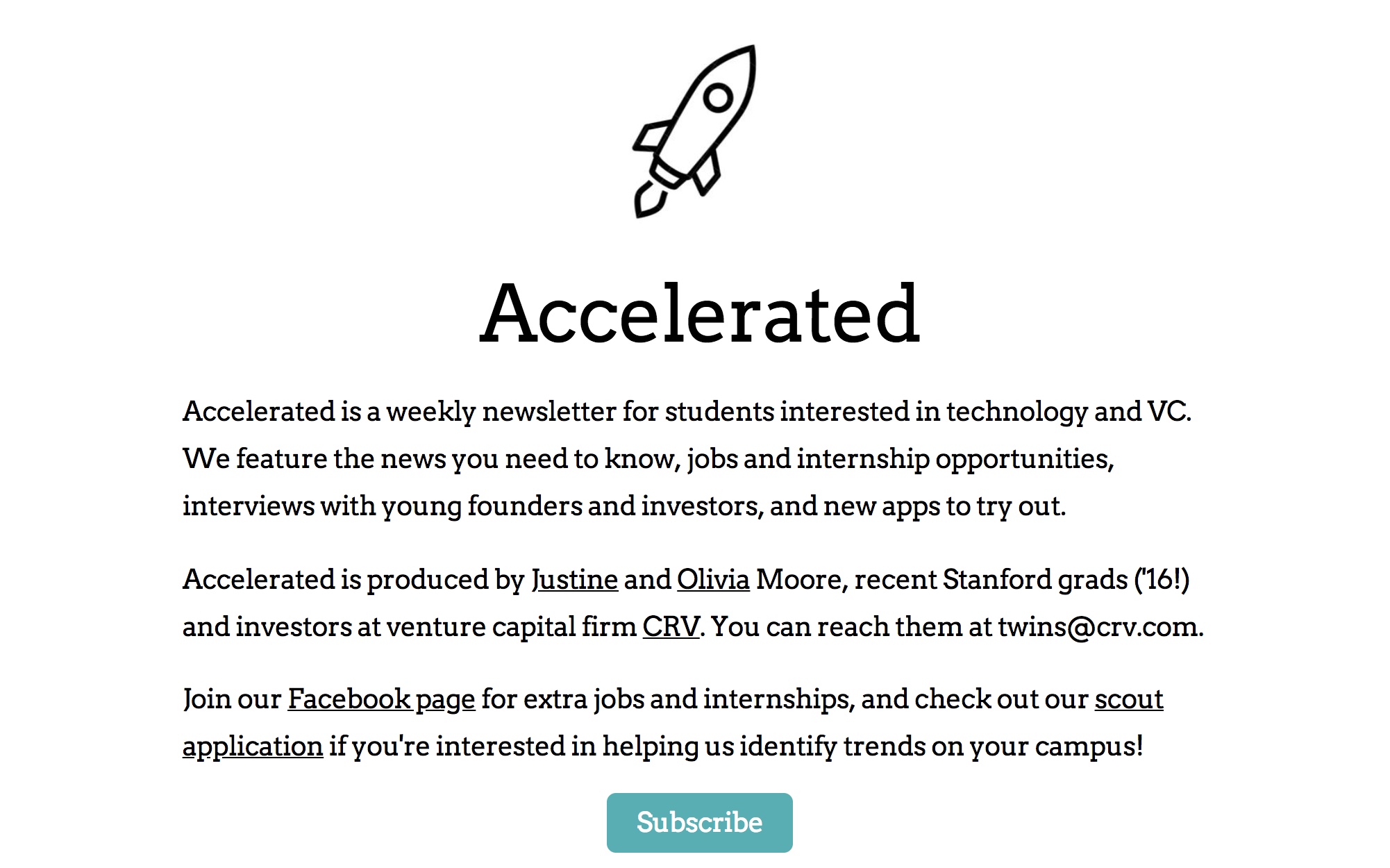
“We are from Oregon and we weren’t engineering majors, so I think the problem we had and part of the reason we went to Goldman was because it’s really hard if you aren’t from here to understand how it works,” Justine said. “Our full-time job is keeping up to date on Silicon Valley, what the hot trends are, who’s hiring, so we decided, why don’t we spend a couple of hours a week creating a newsletter that is the resource we wish we had when we were in college.”
Accelerated has a team of 120 campus ambassadors who Justine and Olivia can text at any time to ask about various topics. “Do you like this company?” “Have you ever heard of this product?” Things like that. So far, the Accelerated network has helped the twins source five potential deals, two of which became CRV portfolio companies. That’s Harper Wilde, a direct-to-consumer bra retailer, and Uppercase, which helps D2C companies open brick-and-mortar stores.
Some takeaways from our recent campus ambassador survey:
Twitter is most abandoned social app, while IG usage has spiked
11% watch ASMR videos
50% have more than one IG account
20% use CBD products, and 54% would try a CBD product from a major brand (e.g. Coke)
— Justine & Olivia (@venturetwins) October 12, 2018
“I think we really underestimated what it would be,” Olivia said. “But being in someone’s inbox every week is this really fun and cool connection.”
CRV isn’t known for its D2C investments; in fact, Harper Wilde was its first ever. With their instincts, youth and network, the twins have quickly proved their value to the firm.
At this point, you’re probably wondering how two 24-year-old siblings can live and work together and not want to kill each other. And it may sound too cutesy and convenient, but they think they’re better together.
“Honestly, we’ve gotten closer over time,” Olivia said. “Going to Stanford together and as we’ve moved into the professional world, we’ve found we are able to communicate really effectively as a team and get things done because there is less worry about stepping on toes or hurting someone else’s feelings.”
The twins plan to stick together, though it’s not necessarily a requirement. For now, they’ll be keeping their residence in Menlo Park, where they have the space to dog-sit former 23andMe president Andy Page’s Bernedoodle.
In 20 years, who knows, maybe Justine and Olivia will be known as some of the greatest consumer VCs the industry has ever seen. They are smart, refreshingly modest and they seem to know their stuff.
“We’d love to be doing this in the long term if we’re good at it,” Justine said.
Olivia agreed.